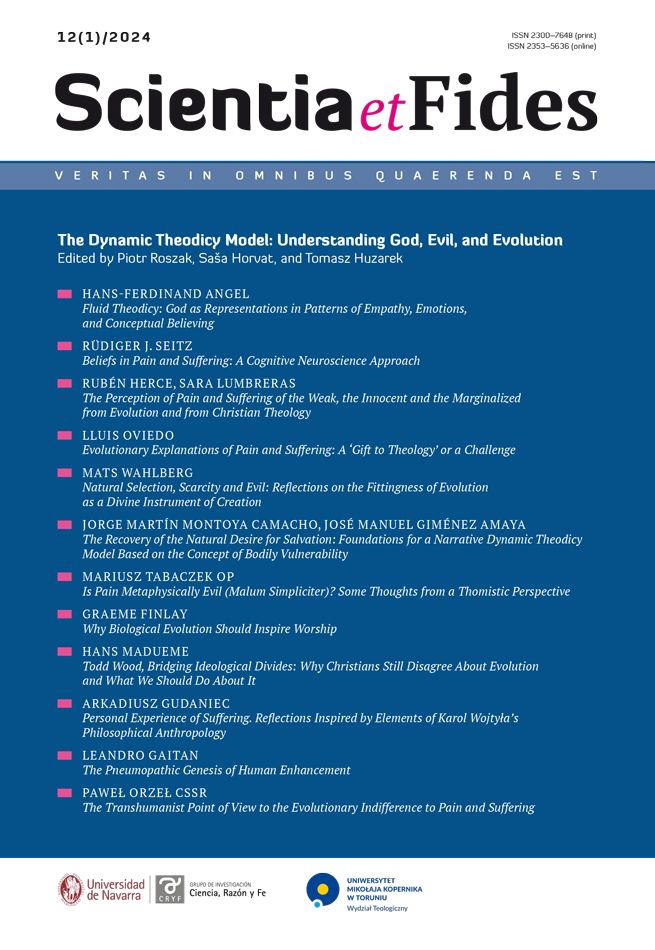Evolutionary Explanations of Pain and Suffering:
A ‘Gift to Theology’ or a Challenge
DOI:
https://doi.org/10.12775/SetF.2024.005Słowa kluczowe
health, grace, salvation, cultural, evolution, altruismAbstrakt
Evolutionary studies have provided several explanations about how pain and suffering can be fitted into that framework, which tries to make sense of every biological and human feature in terms of evolution, survival, and fitness. These explanations point usually to how such apparently negative aspects become useful and contribute to an evolution that after all has delivered good outcomes. Such an approach might eventually render the theodicy question less sharp and critical for believers who are trying to cope with the scandal of so great suffering in our world and history. Theologically we can welcome such new insights, less noticed in former tradition, but at the same time we need to be cautious before a development which could render less clear the message of Christian salvation. In any case, the new data and knowledge clearly invite to revise and reformulate the Christian salvific message, to better answer before the mystery of evil and suffering.
Bibliografia
Ayala, Francisco J. 2007. Darwin’s Gift to Science and Religion. Washington: Joseph Henry Press.
Bassett Rodney L., Sarah Scott, Melissa Emerson et al. 2020. “May Grace Abound: Making God’s Grace Cognitively Salient May Increase Reparative Action.” Journal of Psychology and Theology 48(3): 218–28. https://doi.org/10.1177/0091647119890100.
Boyd, Robert and Peter J. Richerson. 2011. “The cultural niche: Why social learning is essential for human adaptation.” Proceedings of the National Academy of Sciences, 108: 10918–25.
Bregman, Rutger. 2020. Humankind: A Hopeful History. London: Bloomsbury Publishing.
Christakis, Nicholas. 2020. Blueprint: The Evolutionary Origins of Good Society. Boston: Little Brown.
Dańczak, Andrzej. 2020. “The Difficult Ambiguity of the World: Suffering in the Context of Evolutionary Theology.” In Making Sense of Suffering: Theory, Practice, Representation, edited by Bev Hogue and Anna Sugiyama, 19–30. Leiden: BRILL.
Edwards, Denis. 2019. Deep Incarnation: God’s Redemptive Suffering with Creatures, Maryknoll, NY: Orbis.
Emmons, Robert A., Peter C. Hill, Justin L. Barrett, and Kelly M. Kapic. 2017. “Psychological and theological reflections on grace and its relevance for science and practice.” Psychology of Religion and Spirituality 9(3): 276–84. https://doi.org/10.1037/rel0000136.
Fehr, Ernst and Urs Fischbacher. 2003. “The nature of human altruism.” Nature 425: 785–91. https://doi.org/10.1038/nature02043.
Finnegan Diarmid A., David H. Glass, Mikael Leidenhag, David N. Livingstone, eds. 2013. Conjunctive Explanations in Science and Religion. London–New York: Routledge.
Gregersen, Neil H. 2001. “The Cross of Christ in an Evolutionary World.” Dialog: A Journal of Theology 40(3): 192–207.
Judd, Daniel K., W. Justin Dyer, W. J., & Justin B. Top. 2020. “Grace, legalism, and mental health: Examining direct and mediating relationships.” Psychology of Religion and Spirituality 12(1): 26–35.
Kruijthoff, Dirk, Elena Bendien, Kees van der Kooi, Gerrit Glas, and Tineke Abma. 2022. “Prayer and Healing: A Study of 83 Healing Reports in the Netherlands.” Religions 13, 11: 1056. https://doi.org/10.3390/rel13111056.
Laland, Kevin. 2017. Darwin`s Unfinished Symphony: How Culture Made the Human Mind. Princeton & Oxford: Princeton University Press.
Metz, Johann Baptist. 1977. Glaube in Geschichte und Gesellschaft. Studien zu einer praktischen Fundamentaltheologie. Mainz: Matthias-Grunewald-Verlag.
Oviedo, Lluis. 2016. “Religious attitudes and prosocial behavior: A systematic review of published research.” Religion, Brain & Behavior 6: 169–184. https://doi.org/10.1080/ 2153599X.2014.992803.
Oviedo, Lluis. 2022. “Original Sin: The New Scientific Context as Challenge and Opportunity.” Theology and Science 20–1: 99–118. https://doi.org/10.1080/14746700.2021.2012926.
Pinker, Steven. 2011. The Better Angels of Our Nature: Why Violence Has Declined. New York: Viking.
Sollereder, Bethany. 2016. “Evolution, Suffering, and the Creative Love of God.” Perspectives on Science and Christian Faith 68(2): 99–109.
Southgate, Christopher. 2008. The Groaning of Creation: God, Evolution, and the Problem of Evil. Louisville KY, & London: Westminster John Knox Press.
Staub, Ervin and Johanna Vollhardt, J. 2008. “Altruism born of suffering: The roots of caring and helping after victimization and other trauma.” American Journal of Orthopsychiatry 78(3): 267–80. https://doi.org/10.1037/a0014223.
Tomasello, Michael. 2016. A Natural History of Human Morality. Cambridge, MA & London, UK: Harvard University Press.
Wrangham, Richard. 2020. The Goodness Paradox. How Evolution Made Us Both More and Less Violent. London: Profile Books.
Wu, Taoyu and Shihui Han. 2021. “Neural mechanisms of modulations of empathy and altruism by beliefs of others’ pain.” eLife 10: e66043. https://doi.org/10.7554/eLife.66043.
Pobrania
Opublikowane
Jak cytować
Numer
Dział
Licencja
Prawa autorskie (c) 2024 Lluis Oviedo Oviedo

Utwór dostępny jest na licencji Creative Commons Uznanie autorstwa – Bez utworów zależnych 4.0 Międzynarodowe.
CC BY ND 4.0. Posiadaczem prawa autorskiego (Licencjodawcą) jest Autor, który na mocy umowy licencyjnej udziela nieodpłatnie prawa do eksploatacji dzieła na polach wskazanych w umowie.
- Licencjodawca udziela Licencjobiorcy licencji niewyłącznej na korzystanie z Utworu/przedmiotu prawa pokrewnego w następujących polach eksploatacji: a) utrwalanie Utworu/przedmiotu prawa pokrewnego; b) reprodukowanie (zwielokrotnienie) Utworu/przedmiotu prawa pokrewnego drukiem i techniką cyfrową (e-book, audiobook); c) wprowadzania do obrotu egzemplarzy zwielokrotnionego Utworu/przedmiotu prawa pokrewnego; d) wprowadzenie Utworu/przedmiotu prawa pokrewnego do pamięci komputera; e) rozpowszechnianie utworu w wersji elektronicznej w formule open access na licencji Creative Commons (CC BY-ND 3.0) poprzez platformę cyfrową Wydawnictwa Naukowego UMK oraz repozytorium UMK.
- Korzystanie przez Licencjobiorcę z utrwalonego Utworu ww. polach nie jest ograniczone czasowo ilościowo i terytorialnie.
- Licencjodawca udziela Licencjobiorcy licencji do Utworu/przedmiotu prawa pokrewnego nieodpłatnie na czas nieokreślony
PEŁEN TEKST UMOWY LICENCYJNEJ >>
Statystyki
Liczba wyświetleń i pobrań: 709
Liczba cytowań: 0



